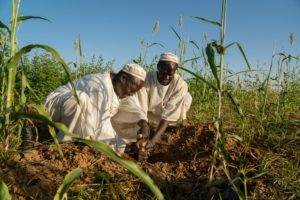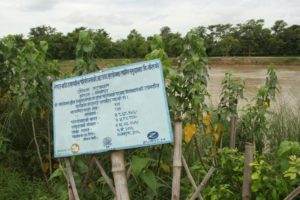Nature Based Solutions
More generally, “nature-based solutions” describe non-traditional, alternative, or indigenous approaches to pressing environmental issues such as flooding, drought, or soil degradation by harnessing natural resources. Some examples of nature-based solutions include protecting and restoring forests, sustainably managing land and water, bringing nature into cities, or protecting and restoring coastal ecosystems. While traditional methods of infrastructure development (also known as “grey” infrastructure) involve constructed and artificial structures, nature-based solutions encompass natural, green, and integrated structures.
Find out more about why nature-based solutions are so important through a closer look at some examples from Practical Action’s work around the world.
Governments and businesses are getting increasingly interested in nature-based solutions because they offer an opportunity to combat the urgent and interconnected challenges of climate change and poverty in a cost-effective way. Healthy ecosystems are the foundation upon which our societies and economies are built. According to the International Union for Conservation of Nature (IUCN), in recent years, nature-based solutions have generated a growing global momentum towards a more sustainable future. However, for nature-based solutions to be beneficial, they also must provide societal advantages. From design to implementation, nature-based solutions must include the voices of local, marginalised, and indigenous peoples and women, and they must work first and foremost to the benefit of these communities to help them adapt to the impacts of climate change.
At Practical Action, nature-based solutions are an integral part of many of our projects with communities around the world that are already experiencing climate change impacts. Our work in Sudan and Nepal, among others, provide much-needed evidence for the effectiveness of inclusive and community-centred nature-based solutions to local and national decision-makers and planners.
In North Darfur in Sudan, rainfall has become less reliable due to climate change. Farmers don’t have enough water to irrigate their crops properly or to give to their animals. Whole communities have abandoned their homes after losing their farmland to desertification.

Re-greening helps barren areas of Sudan come back to life
Our climate change adaptation work involves 35,600 people from 19 villages over a three-year period, aiming to improve conditions and address some of the threats posed by climate change. Water management, forest planting, re-greening, farming, and business training are all part of a solution that will help communities in Sudan thrive, even in one of the world’s toughest places to farm.
Our integrated water resource management is helping communities restore the land in and beyond low-lying, fertile wadis (natural water sources). Earth dams and crescent terraces are constructed to reduce runoff, increase infiltration, and prevent gully formation.
As part of rangeland rehabilitation, good-quality indigenous grass seeds are planted. We also supported communities to plant trees to restore communal forested areas and sustainably manage rangelands. As a result of these actions, underground water sources have been replenished, forests have been restored and farmland is fertile once again. Food security has improved and conflict between farmers and pastoralists has reduced.
“Planting forests to re-green land lost to the changing climate is one of the ways we use the saved water. These trees put vital nutrients back into the soil, making it more fertile. Their roots also improve the soil’s stability, decreasing the damage caused by floods during the rainy season. This work, along with the extra water available for irrigation, helps make farming more viable on more land that was previously barren.” Awadalla Hamid Mohamed, Practical Action Project Manager in Sudan
For a more detailed look at how sustainable land and water management in Sudan is making a difference to the communities we are working with as well as stories from the ground, see our snapshot: Community-based Land and Water Management for Adaptation at Scale in Sudan. Our water management work in Sudan was also recently featured in a report by Bond: Nature-based Solutions in Action: Lessons from the Frontline.

The 220m-long bio-dyke on the Karnali River in Nepal was built by the local community with our support, using natural, locally available materials. It’s protecting the property, possessions and crops of 135 households from flooding.
In Nepal, climate change has caused monsoon flooding to become increasingly severe and unpredictable. Local people’s crops, property and businesses are destroyed by floods every year. Bio-dykes are an environmentally-friendly alternative to traditional concrete flood defence structures that are expensive to build, damaging to the environment, and catastrophic when they fail.
Practical Action worked with communities in the Karnali river basin in Nepal to build bio-dykes by strategically planting locally available trees and other plants. The bio-dykes bind the soil and help prevent erosion, maintaining the original flow of the river while also preventing the river from overflowing after heavy rainfall. Bio-dykes deliver economic, environmental, and social benefits. They really are a win-win-win solution – unlocking the triple dividend of resilience in terms of saving lives and avoiding losses when disasters strike, effectively stimulating local economic activity, and delivering additional development co-benefits. Bio-dykes have been instrumental in protecting communities’ homes, agricultural land, and public infrastructure, reversing the annual cycle of flood losses and increasing the confidence of communities to invest in long-term land and farm productivity.
“The river used to erode 4-5 metres of land every year. Two people from each household worked for 25 days to build this bio-dyke. This year there has been no soil erosion at all.”
Phularam Chaudhary, local flood resilience committee chair
This innovative use of bio-dykes has been recognised by the government of Nepal, which has prioritised the replication of bio-dykes in other locations in their annual national budget for flood protection.
Our flood protection work in Nepal is one of three natural solutions being used to develop a new methodology to help make the case for nature-based solutions and take them to scale. The methodology, created in partnership with the Zurich Flood Resilience Alliance, provides a framework by which communities can assess the financial, social and environmental costs and benefits for themselves – providing a robust, real-world business case with which to attract government, donors, community organizations, and NGO partners.
Nature-based solutions that are inspired by nature and work with it, rather than against it, are positive alternatives to traditional methods of infrastructure development. As we face accelerating climate change and biodiversity loss, practical, green options have never been more valuable.
Demet Intepe
Researcher and policy expert in climate justice, climate change adaptation, and sustainability. Currently leading on the mainstreaming of climate change adaptation and mitigation across Practical Action’s programmatic and policy work, as well as Practical Action’s organisational commitment to sustainability.
{
“@context”: ”
https://schema.org/”
,
“@type”: “Article”,
“name”: “Nature Based Solutions”,
“author”: [
{
“@type”: “Person”,
“name”: “Demet Intepe”,
“jobTitle”: “Climate and Resilience Officer”,
“url”: ”
https://www.linkedin.com/in/demetintepe/”
,
“telephone”: “+4401926 634400”,
“worksFor”: [
{
“@type”: “Organization”,
“name”: “Practical Action”,
“url”: ”
https://practicalaction.org”
,
“logo”: ”
https://practicalaction.org/wp-content/uploads/2023/11/logo-practical-action-square.png”
}
]
},
{
“@type”: “Organization”,
“name”: “Practical Action”,
“url”: ”
https://practicalaction.org”
,
“logo”: ”
https://practicalaction.org/wp-content/uploads/2023/11/logo-practical-action-square.png”
}
]
}